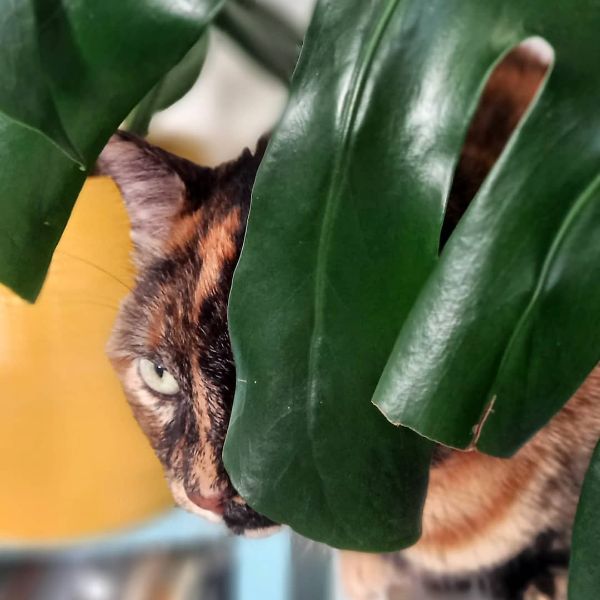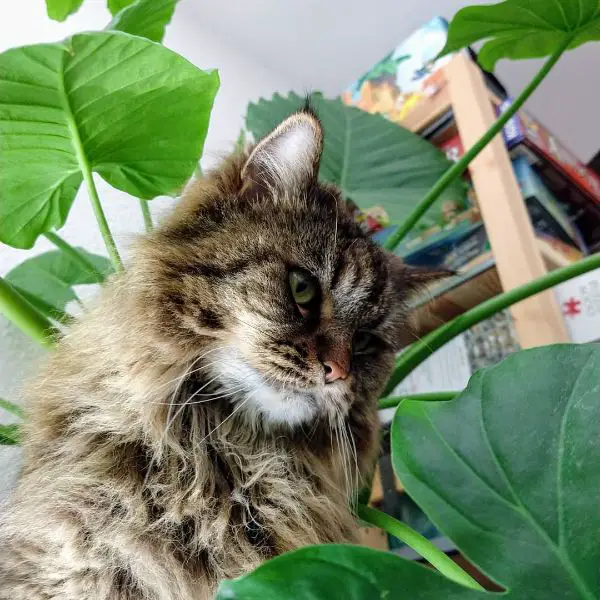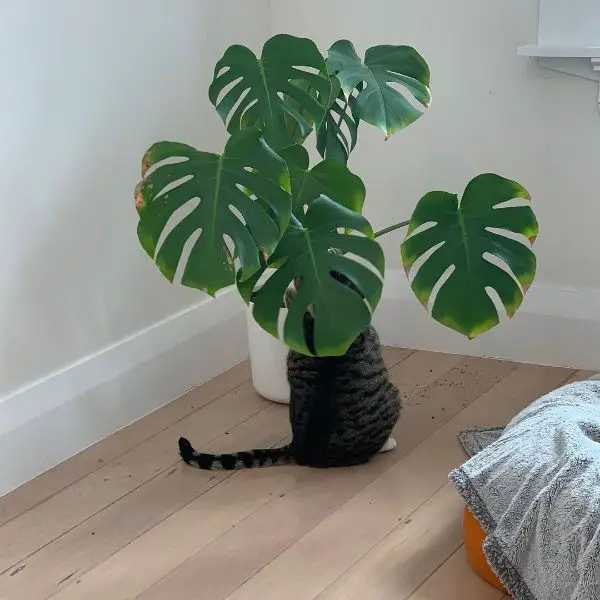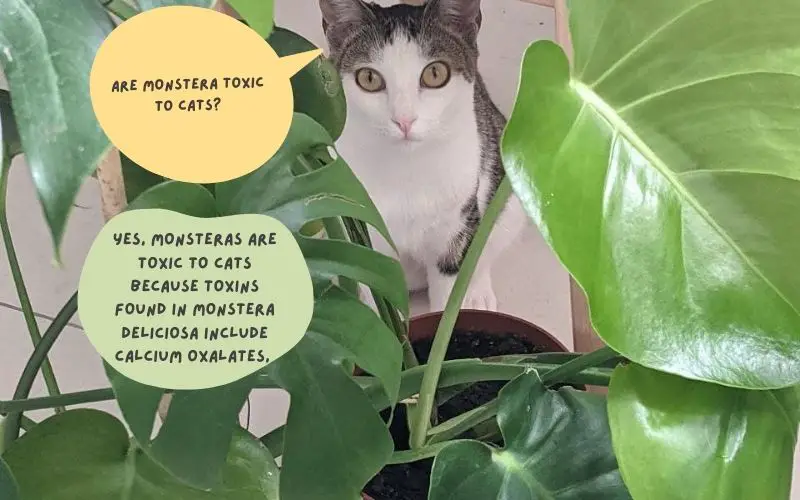Monstera is a popular houseplant with attractive foliage and leaf holes. And if your house has both a Monstera Plant and a cat as a pet, there will always be a question of particular interest “are Monstera toxic to cats?” This is a concern that constantly comes up when buying a new plant. Let’s get started on answering this question
Are Monstera toxic to cats?
Yes, Monsteras are toxic to cats because toxins found in Monstera Deliciosa include calcium oxalates, which are insoluble and difficult to digest in the stomach. When cats gnaw or nip at the leaves, this hurts their lips and tongues. The cats’ inability to metabolize the leaves produces drooling and, in some cases, vomiting and expulsion of the leaves from their bodies. It could also induce facial swelling and a burning feeling on their tongues, making eating difficult.
When cutting across leaves or stems, the plant often secretes sap. The sap can cause itching and even burn in people or animals with thin, sensitive skin.
How is Monstera poisonous to cats?
Calcium oxalate is mostly found in the form of crystals in the vascular tubes and tissues of plants. It is responsible for regulating the calcium levels in the plant and is a defense mechanism against herbivores.
Monstera Deliciosa is one of the plants that produce calcium oxalate and store it mostly in the leaves.
Some cats have a habit of chewing and nipping on the leaves. When Monstera is used in this manner, the calcium oxalate is absorbed into the tongue, resulting in excruciating burning and agony. This leads to swelling in the mouth and esophagus. The swelling will cause difficulty in breathing, and there would be other symptoms like drooling and anorexia (loss of appetite).
The cat would start pawing at the mouth and scratch at the irritation. Your cat will also vomit anything it tries to eat.

How to diagnose Monstera plant poisoning in cats
Once you have the answer to are monstera toxic to cats, dig deeper into your research. Cats will only be poisoned by a Monstera Deliciosa if they chew the plant. The fastest way to diagnose whether this is the case is to check the plant.
If your cat is showing signs of Monstera poisoning, and there are chunks bitten out of your houseplant, then it’s likely that they need to be treated.
Related Post: Can Monstera live outside? Tips to make them thrive outdoor
Symptoms Of Cat Poisoning By The Monstera Plant
Symptoms of Swiss Cheese poisoning, often known as swiss cheese poisoning, should occur within a few hours. Your cat will be quite upset as soon as they bite down unless they are unaware of the burning and itching in their mouth.
If your cat has eaten or chewed off sections of your Swiss Cheese plant, the following symptoms may occur:
- Lips and mouth are red and irritated
- Mouth pawing (from the pain)
- Drooling in excess
- Swelling mouth
- Vomiting
- Appetite sluggishness

Treatment For Cats Poisoned By The Monstera Plant
You might give your cat something to ease the burning feeling in their mouth as a first-aid reaction. In these instances, milk is an excellent choice since it tastes delicious and the crystals attach to the calcium.
After that, stay with your cat and observe their respiration before contacting your veterinarian or a pet poison control center. Trouble breathing is uncommon with Monstera poisoning, but if they appear to be fighting, take them to the vet right away.
This toxin has no specific therapy; instead, you must treat the symptoms until they improve. A deadly response is highly rare and would require a significant amount of Monstera to be consumed.

How can you keep your Monstera from being chewed on by your pets?
You’re probably thinking about how to solve the problem now that you know Monstera is poisonous to cats. Don’t be concerned. We’ve got your back.
1. Control who has access to the location
If your pets are plant chewers, keep them in a locked area where your dog or cat can’t get to them. Just make sure it’s light enough and has the correct growing conditions.
Caging your plants is another option to restrict access. Your plants will still be visible and it will be enticing if you utilize an enclosed glass vivarium or greenhouse cabinet.
It is much easier to control their access if you simply have dogs. You may give your Monstera to them or put it somewhere they can’t reach it, such as high cabinet tops or desks.
2. Plants that are pet-friendly
If you have a cat or dog who likes to nibble on your houseplants, you might consider getting pet-safe plants. You can’t go wrong with a lovely one.
Plants that are safe for cats include:
- Chinese Fan palm, Areca palm, Majestic, Cascade, Parlor, and Ponytail palms are all real palms (Arecaceae).
- Echeveria, Haworthia, Hens and Chicks are examples of succulents. Sedum, Graptoveria, Lithops, and Opuntia are just a few examples.
- Rainbow, Watermelon, Baby Rubber Plant, trailing jade, Jelly, Teardrop, Emerald Ripple, Rosso, String of Turtles, Ruby, Frost, Hope, or Ruby Cascade are all peperomias species.
- Pinstripe, rose painted, Freddie, Zebra plant, White fusion, Peacock plant, and other Calatheas
- Asparagus fern is a kind of fern that grows on asparagus.
- Hoya
- Violets from Africa
- Plants that resemble spiders
- The plant made of cast iron
- Tears of a baby
- Aluminum smelter
- Plants for prayer
The number of attractive houseplants that are safe for cats or dogs is infinite. We’re sure you won’t be able to resist an attractive pet-friendly plant.
3. Make it difficult to eat
Citrus fruits are repulsive to both dogs and cats. As a result, you may use it to discourage chewing on your plants. We cannot guarantee that these pets will not gnaw on your plants, but it will deter them.
Also, because dogs and cats dislike cayenne pepper, you may spray your plants with it. They also dislike the smell of vinegar, among other things. Simply do your homework and find out what works best for you.
4. Teach your dogs new tricks
Cats and dogs can be trained if you have patience and know-how. If you are too busy to instruct your pets not to eat houseplants, you may hire an expert to assist you. Why not educate them not to eat plants while they’re learning to utilize their smaller boxes?
5. Provide them with a variety of safe plants to choose from
Giving your pets safe alternatives to hazardous or dangerous houseplants is another approach to keep them from eating them. Dogs, for example, like gnawing on basil, dill, fennel, thyme, lemongrass, grass, and other herbs. Instead, why not offer them these plants?
Cats, on the other hand, will consume catnip, cat thyme, rosemary, zinnias, marigolds, wheatgrass, and other similar plants. Consider giving them one of these non-toxic plants. You may also purchase cat grass.
6. Get their health examined
Dogs and cats should not consume too much vegetation. They have the potential to induce indigestion. This might also signal that anything is wrong with their health. So, if your dog or cat seems to be preoccupied with eating plants, you should consult your veterinarian. It might be hairballs, a nutrient shortage, stress, or your pet is sick.


